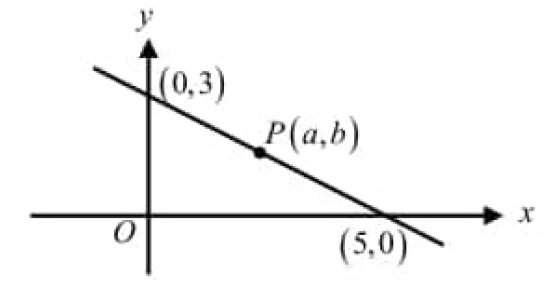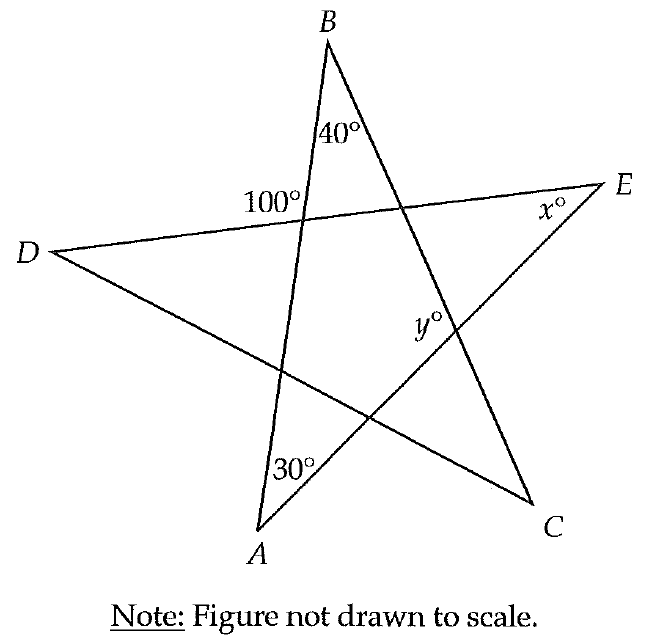FIND THE VOLUME OF EACH FIGURE
What is volume ?
Volume is the number of three-dimensional spaces an object occupies.
It is measured in cubic units such as cubic meters, cubic centimeters, etc.
What is the volume of prisms ?
A prism is solid with a uniform cross-section. This means that no matter where it is sliced along its length, the cross-section is the same size and shape.

To find the volume for any solid of uniform cross-section
Volume = area of cross-section × length
Find the volume of the following :
Problem 1 :
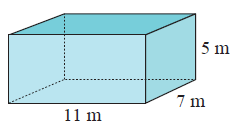
Solution :
By observing the figure, it is a rectangular prism.
Here area of cross-section is the shape of the rectangle.
To find the volume,
Volume = length × width × height
we have,
length = 11 m, width = 7 m and height = 5 m
Volume = 11 × 7 × 5
Volume = 385 m3
Problem 2 :
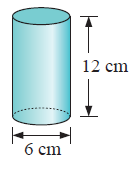
Solution :
By observing the figure, it is a cylinder.
Here area of cross-section is the shape of the circle.
To find the volume,
Volume = area of cross-section × length
Volume = area of the circle × length
Volume = (πr2) × h
we have,
diameter = 6 cm,
radius (r) = 6/2 = 3 cm and height (h) = 12 cm
= π(3)2 × 12
= (3.14 × 9 × 12)
Volume = 339 cm3
Problem 3 :
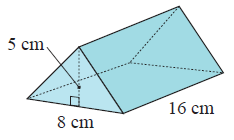
Solution :
By observing the figure, it is a triangular prism.
Here area of cross-section is the shape of the triangle.
To find the volume,
Volume = area of cross-section × length
Volume = area of the triangle × length
= (1/2 × b × h) × l
we have,
base (b) = 8 cm, height (h) = 5 cm and length (l) = 16 cm
= 1/2 × 8 × 5 × 16
Volume = 320 cm3
Problem 4 :
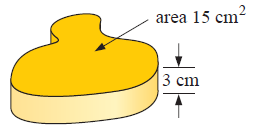
Solution :
By observing the figure, it is a irregular prism.
Here area of cross-section is the irregular shape.
To find the volume,
Volume = area of cross-section × length
we have,
area = 15 cm2, and length = 3 cm
Volume = 15 × 3
Volume = 45 cm3
Problem 5 :
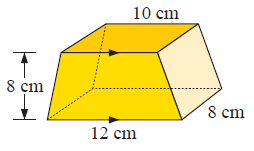
Solution :
By observing the figure, it is a trapezium prism.
Here area of cross-section is the shape of the trapezium.
To find the volume,
Volume = area of cross-section × length
Volume = area of the trapezium × length
= 1/2 × h × (b1 + b2) × length
we have,
base (b1) = 12 cm, base (b2) = 10 cm, height (h) = 8 cm and length = 8 cm
= 1/2 × 8 × (12 + 10) × 8
= 88 × 8
Volume = 704 cm3
Problem 6 :
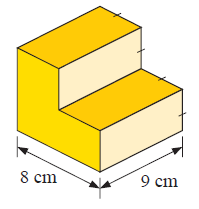
Solution :
By observing the figure, it is a irregular prism.
Here area of cross-section is the shape of the rectangle and square.
To find the volume,
Volume = area of cross-section × length
Volume = (area of the rectangle + area of the square) × length
= [(s2) + (l × w)] × length
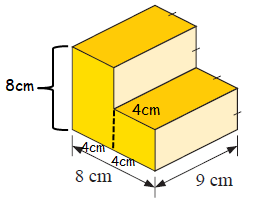
we have,
side (s) = 4 cm, length (l) = 8 cm, width (w) = 4 cm and length = 9 cm
Volume = [(42) + (8 × 4)] × 9
= (16 + 32) × 9
Volume = 432 cm3
Problem 7 :

Solution :
By observing the figure, it is a semicircle prism.
Here area of cross-section is the shape of the semicircle.
To find the volume,
Volume = area of cross-section × length
Volume = area of the semicircle × length
= 1/2 πr2 × length
we have,
diameter = 6 cm,
radius (r) = 6/2 = 3 cm and length (l) = 18 cm
= 1/2π(3)2 × 18
= (1/2 × 3.14 × 9) × 18
= 14.13 × 18
Volume = 254 cm3
Problem 8 :
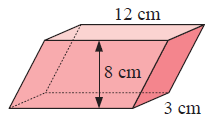
Solution :
By observing the figure, it is a parallelepiped.
Here area of cross-section is the shape of the parallelogram.
To find the volume,
Volume = area of cross-section × length
Volume = area of the parallelogram × length
= (b × h) × length
we have,
base (b) = 12 cm, height (h) = 8 cm and length = 3 cm
Volume = (12 × 8) × 3
Volume = 288 cm3
Problem 9 :
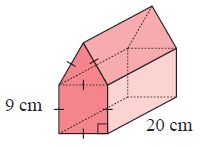
Solution :
By observing the figure, it is a house-shaped prism.
Here area of cross-section is the shape of the triangle and square.
To find the volume,
Volume = area of cross-section × length
Volume = (area of the triangle + area of the square) × length
= (√3/4 a2 + s2) × length
we have,
side (s) = 9 cm, side (a) = 9 cm and length = 20 cm
= [√3/4(92) + 92] × 20
= 116 × 20
Volume = 2321 cm3

Apart from the stuff given above, if you need any other stuff in math, please use our google custom search here.
Kindly mail your feedback to v4formath@gmail.com
We always appreciate your feedback.
©All rights reserved. onlinemath4all.com
Recent Articles
-
Digital SAT Math Problems and Solutions (Part - 134)
Apr 02, 25 12:40 AM
Digital SAT Math Problems and Solutions (Part - 134) -
SAT Math Resources (Videos, Concepts, Worksheets and More)
Apr 02, 25 12:35 AM
SAT Math Resources (Videos, Concepts, Worksheets and More) -
Digital SAT Math Problems and Solutions (Part 135)
Apr 02, 25 12:32 AM
Digital SAT Math Problems and Solutions (Part 135)
